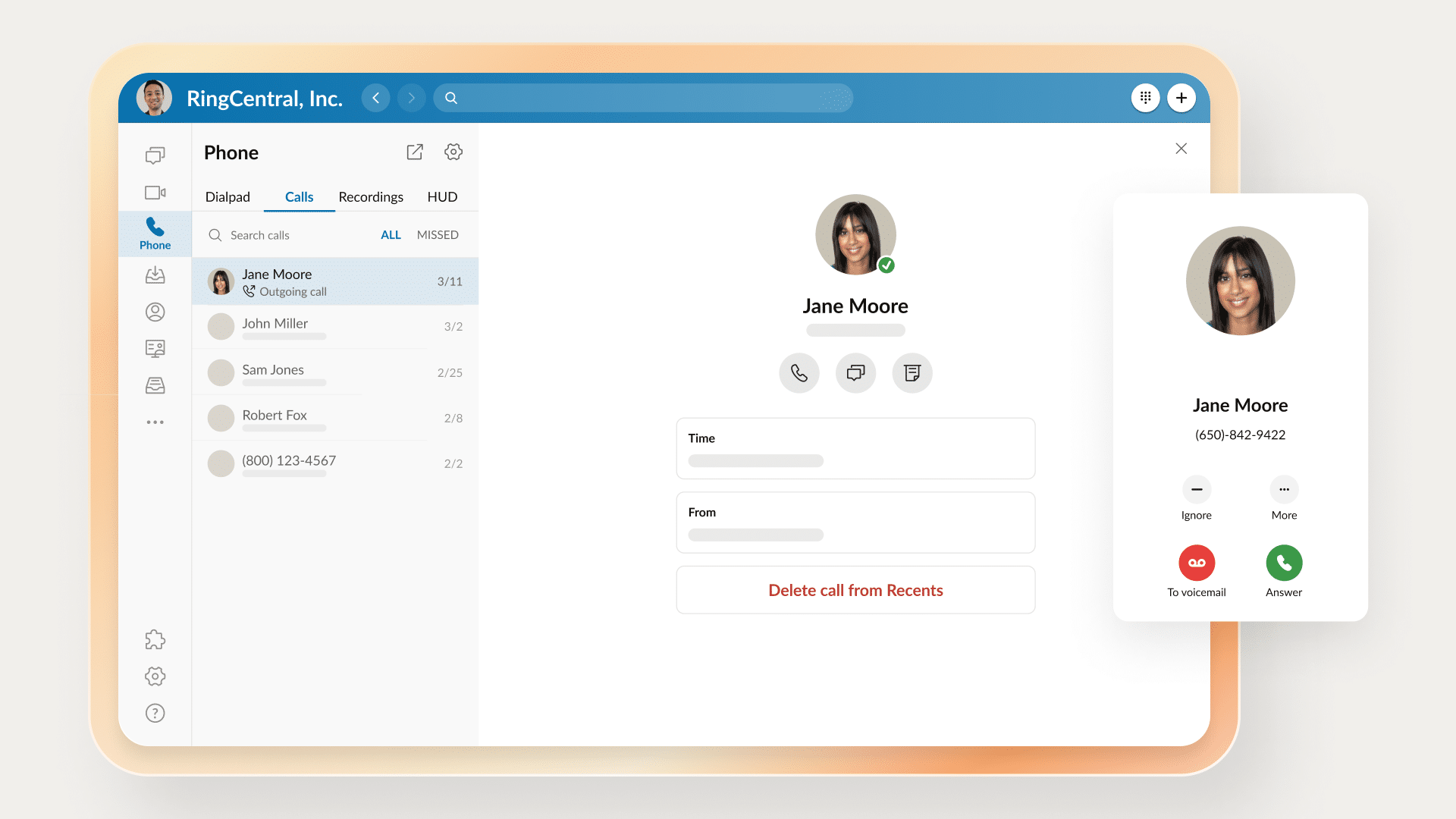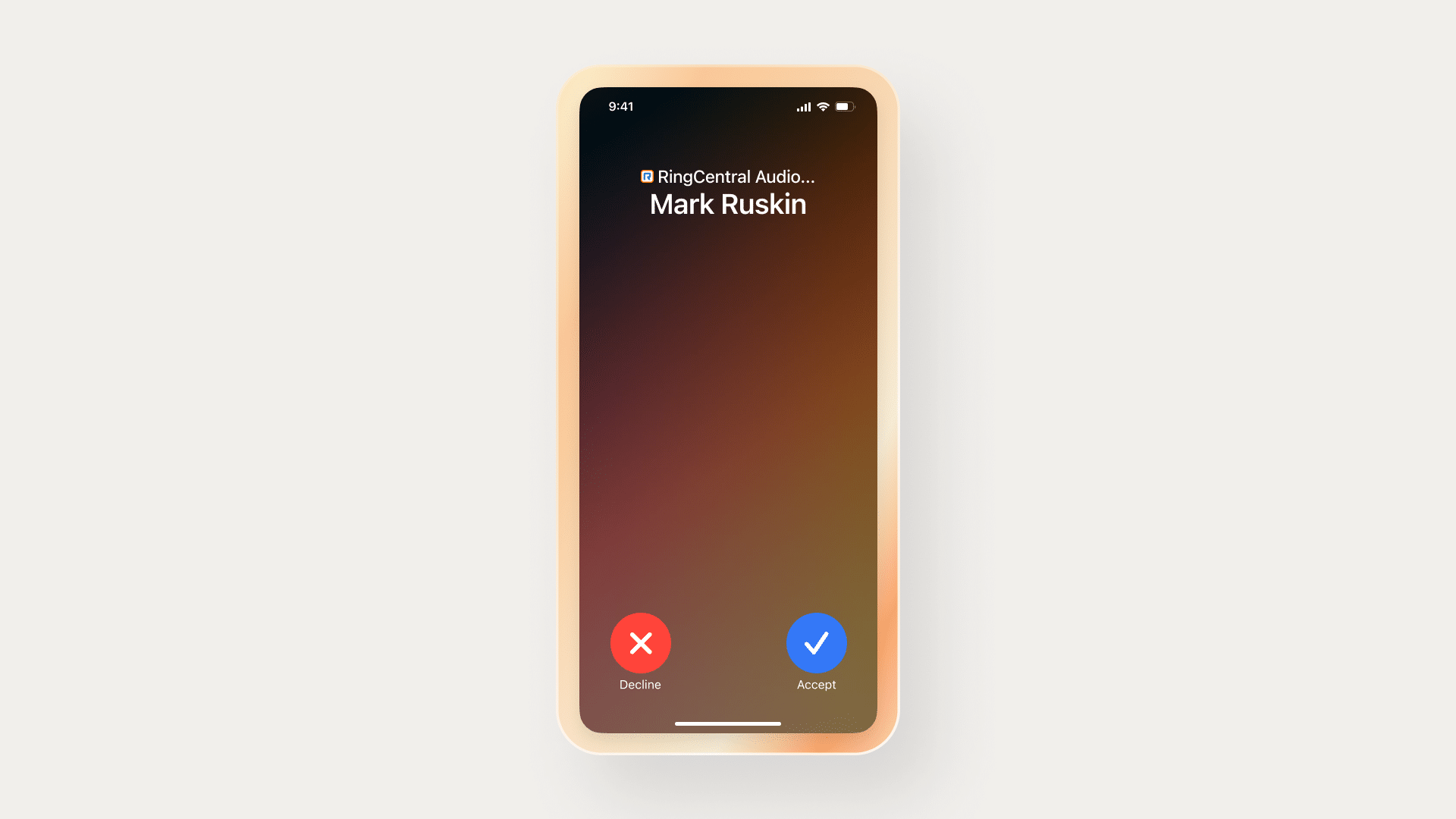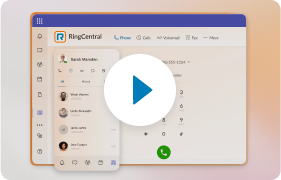Call masking (also sometimes known as “number masking” or “phone number masking”) is a popular call feature for many VoIP users. It helps small businesses make a good first impression by using local phone numbers, which customers are more likely to trust and answer. Some VoIP providers even offer the option to get a custom phone number that’s memorable and aligned with your brand.
But this is far from the only benefit of call masking for small businesses. In addition, call masking can preserve both customer and employee privacy, improve your customer experience, boost your ROI, and more.
Here, we’ll take a look at what call masking is, how it works, and the many benefits it can bring for small businesses.
What is call masking
Call masking involves hiding or changing the caller’s personal contact details as they appear on the display of the recipient. It may sound deceptive, but it’s not really. Because call masking is a feature of virtual phone calling, the original phone is technically a proxy phone “located” in the internet, so it doesn’t have a landline number in the first place.
Through call masking, you give your VoIP phone an “identity” that it doesn’t otherwise have. This identity can be very useful for reassuring potential business leads and establishing a local presence through a local phone number.
How does call masking work?
Call masking largely works by assigning a temporary virtual phone number which overlays the caller’s contact details.
Let’s say that your “real” company number is BBB BBBB, but you want to build a local presence in an area with an AAA dialing code. With call masking, you can place a call to AAA code areas that will appear in customer dial displays as AAA BBBB. But, behind the scenes, the call is actually coming from your original BBB BBBB address.
In practical terms, there are six stages to the call masking process:
1) You or you agents log into your VoIP system and makes a call
2) The call connects to a server in the Cloud, which automatically generates a temporary “mask” number
3) The platform’s API connects the call to the recipient
4) The customer’s phone rings, and displays the masked phone number
5) Your agent and the recipient converse, each unable to see the “true” contact information of the other
6) When the call ends, the mask number returns to the server, to be reassigned to another agent when needed
The benefits of call masking for small businesses

So, why exactly should small businesses use call masking? It’s simple enough to do, especially with a good communications platform like RingCentral—but why should you do it? What’s the benefit for business?
Making phone calls with a call masking feature actually has a lot of benefits both for businesses and their customers. Here are just a few of the most significant:
Call masking protects employee privacy
It’s impossible to overstate the importance of data privacy for modern customers and modern employees alike. Phone numbers are one of the most sensitive forms of data out there.
From an employee point of view, call masking protects their personal, private cell phone numbers from getting into the wrong hands. This is particularly relevant for small businesses, which may rely on widespread teams working remotely from their own personal devices rather than on a large staff based in a call center using a good communication platform for internal and external communications.
With call masking, employees using their own private phones to work for you can keep their data perfectly safe during business calls without losing their unique numbers for personal calls.
Similarly, call masking can be used to protect customer privacy. This is an important topic in its own right, so let’s take a look.
Call masking protects customer privacy
Customer data is heavily protected in modern laws all over the world, and there’s not much data more sensitive and protected than phone data. Penalties for not treating customer contact data carefully and with the utmost respect can be extraordinarily severe.
For example, WhatsApp was fined a record-breaking € 225 million (USD267 million) for breaking GDPR (the European data protection regulation) guidelines on the storage and processing of customer contact details. In 2023, WhatsApp was fined a further € 5.5 million for the same thing. These are not light penalties, and can’t be brushed off even by a company as large as WhatsApp.
So, in order to protect customer privacy and remain compliant, it’s very important that you shield customer contact data from everyone who does not absolutely need to have it. Call masking is an effective way of doing this.
Let’s say, for example, that you run delivery services. In this industry, customers often need to communicate directly with their courier, but may not want their courier to have their personal phone number (and vice versa). With call masking, courier and customer can communicate effectively without either ever knowing the “real phone number” of the person they’re talking to. When the transaction ends, neither courier nor customer will be able to contact one another again.
Call masking helps to establish a local presence
People are often wary of unfamiliar numbers. After all, who knows who could be on the other end of the phone, or what they might want?
Customers often ignore calls from unfamiliar numbers. However, they’re much more likely to answer calls from local-looking numbers. This is because people assume local calls are more relevant to them. Even if the call isn’t specifically about local matters, customers tend to be more receptive when they see a familiar area code compared to an unknown number. This initial positive reaction can set the tone for the entire conversation.
This is where call masking comes in. Your business may be based in and/or highly relevant to a particular area, but modern tech means you may not have a local business phone number. Maybe you use a widely-flung range of call agents, or maybe your VoIP number simply isn’t local enough. Whatever the issue, it’s solvable with call masking.
Call masking lets you pick a number that will appear with the local dialcode on recipient screens, no matter where you’re actually calling from. So, you can get the benefit of greater call uptake and better customer receptiveness no matter where in the world you’re calling from or to.
Call masking is easy and cost-effective
Call masking is the cheapest and simplest way to increase call volumes without compromising customer or employee data.
Data privacy should always be a big consideration when scaling your business in any way, but especially so when you’re scaling a communications operation. There are several costly and cumbersome ways of securing your communications data while scaling, including purchasing additional phone numbers. But why bother with all of this hassle and expense when you can simply mask calls?
Similarly, there are other ways to get the other benefits of call masking. For example, you could establish a local presence in various places by setting up physical contact centers in those areas. But, again, this is very costly and logistically complicated. So why go to the bother when you can get exactly the same benefits and results with simple call masking.
All in all, call masking is the most simple and cost-effective way of getting the benefits we’ve mentioned above, plus more. Whether you’re making a voice call or a video call, with the simple touch of a button, you can call customers from a “local” number while protecting both their and your own data. It couldn’t be easier, and it’s not at all expensive, especially when you get your call masking feature as part of a package from RingCentral.
Use call masking to boost your business and protect your data

In this day and age, you really cannot be too careful about data. It’s vital to protect both your customers’ data and the data of your employees. This is especially true when you’re dealing with phone numbers. Many customers (rightly) fear their personal phone numbers falling into the wrong hands, and businesses should do everything in their power to prevent this from happening.
Call masking is a simple to use feature that can effortlessly protect both your customers’ information and the information of your employees (which is particularly important if they’re working from their own personal devices). At the touch of a button, you can mask all important details without compromising the quality of communication.
But that’s not all. Call masking also allows you to take on the kinds of trustworthy locally-coded numbers that will make potential customers more receptive to you. This could bring a big boost to your call pickup rate and your ultimate conversion rate.
So, what are you waiting for? Check out RingCentral’s call masking capabilities today.
FAQs
What industries can benefit from call masking?
Call masking is beneficial across various industries, including:
- E-commerce: Protects customer and delivery personnel’s phone numbers.
- Real estate: Keeps client and agent contact details confidential.
- Healthcare: Ensures patient privacy when scheduling appointments.
- Customer service: Enhances the security of customer support interactions.
Are there any legal considerations with call masking?
Yes, businesses should be aware of and comply with local regulations regarding call recording and privacy. It is important to inform all parties involved that the call is being masked and, if applicable, recorded, to adhere to legal standards and maintain transparency.
Can call masking be customized for different business needs?
Yes, call masking services can often be tailored to meet the specific needs of a business. This includes setting up customized workflows, integrating with existing CRM systems, and configuring settings to match the business’s operational requirements.
Updated Mar 31, 2025












